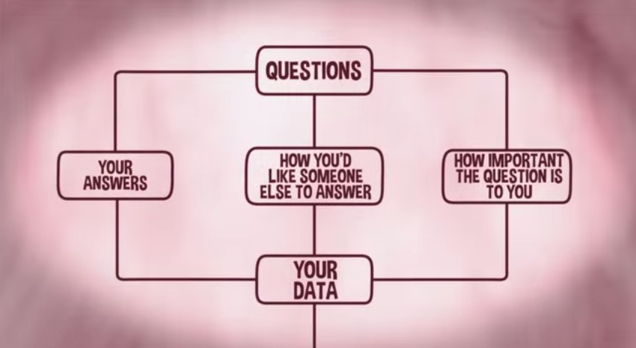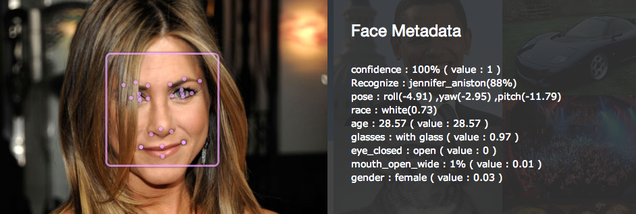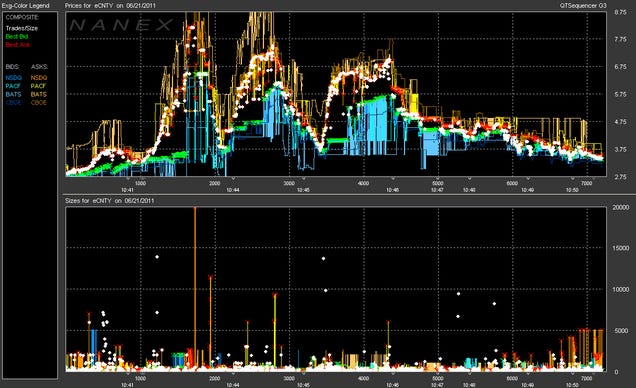Posted on 05/25/2014 9:30:53 PM PDT by ckilmer
 Expand
Expand
The importance of algorithms in our lives today cannot be overstated. They are used virtually everywhere, from financial institutions to dating sites. But some algorithms shape and control our world more than others — and these ten are the most significant.
Just a quick refresher before we get started. Though there's no formal definition, computer scientists describe algorithms as a set of rules that define a sequence of operations. They're a series of instructions that tell a computer how it's supposed to solve a problem or achieve a certain goal. A good way to think of algorithms is by visualizing a flowchart.
There was a time not too long ago when search engines battled it out for Internet supremacy. But along came Google and its innovative PageRank algorithm.
 Expand
Expand
Today, Google accounts for 66.7% of the U.S. market share in core search, followed by Microsoft (18.1%), Yahoo (11.2%), Ask (2.6%), and AOL (1.4%). Google now dominates the market to the point where we don't even question it anymore; for many of us, it's our primary avenue of entry into the Internet.
PageRank works in conjunction with automated programs called spiders or crawlers, and a large index of keywords and their locations. The algorithm works by evaluating the number and quality of links to a page to get a rough estimate of how important the website is. The basic idea is that the more important or worthwhile websites are likely to receive more links from other websites. It's basically a popularity contest. In addition to this, the PageRank algorithm considers the frequency and location of keywords within a web page and how long the web page has existed.
As much as we may be loathe to admit it, the Facebook News Feed is where many of us love to waste our time. And unless your preferences are set show all the activities and updates of all your friends in chronological order, you're viewing a pre-determined selection of items that Facebook's algorithms have chosen just for you.
To calculate which content is most interesting, it considers several factors, such as the number of comments, who posted the story (yes, there's an internal ranking of "popular" people and those with whom you interact with the most), and what type of post it is (e.g. photo, video, status, update, etc.).
Online dating is now a $2 billion industry. Thanks to the growth of such sites as Match.com, eHarmony, and OKCupid, the industry has expanded at 3.5% a year since 2008. Analysts expect this acceleration to continue over the next five years — and for good reason: It's an extremely effective way for couples to meet. Not only do dating sites result in more successful marriages, they do an excellent job matching prospective couples based on their various preferences and tendencies. And of course, all this matching is done by algorithms.
 Expand
Expand
Take OKCupid, for example, a free online dating site co-founded by Harvard mathematician Christian Rudder. OKCupid takes a decidedly analytic approach to online dating, pulling reams of information from their users. But there's more to OKCupid's matching algorithm than just a brute matching of common interests; each answer is weighed by how important the question is to the user and their prospective partner. It's the so-called difference that makes the difference — one that makes OKCupid one of the more effective online dating sites.
We are increasingly being watched not by people, but by algorithms. Thanks to Edward Snowden, we know that the National Security Agency (NSA) and its international partners have been spying on millions upon millions of unsuspecting citizens. Leaked documents have revealed the existence of numerous surveillance programs jointly operated by the Five Eyes, an intelligence alliance comprised of the U.S., Australia, Canada, New Zealand, and the United Kingdom. Together, they've been monitoring our phone calls, emails, webcam images, and geographical locations. And by "they" I mean their algorithms; there is far too much data for humans to collect and interpret.
 Expand
Expand
(ReKognition)
Interestingly, the NSA claims that they're not actually "collecting" our data. According to a 1982 procedures manual, "information shall be considered as 'collected' only when it has been received for use by an employee of a DoD intelligence component in the course of his official duties." And "data acquired by electronic means is 'collected' only when it has been processed into intelligible form." Bruce Schneier from The Guardian explains:
So, think of that friend of yours who has thousands of books in his house. According to the NSA, he's not actually "collecting" books. He's doing something else with them, and the only books he can claim to have "collected" are the ones he's actually read.
Which is a problem because:
Computer algorithms are intimately tied to people. And when we think of computer algorithms surveilling us or analyzing our personal data, we need to think about the people behind those algorithms. Whether or not anyone actually looks at our data, the very fact that they even could is what makes it surveillance.
Lastly and relatedly, there's also the NSA's Suite B Cryptography to consider, powerful algorithms that are used for encryption, key exchange, digital signatures, and hashing. This is what the agency uses to protect both classified and unclassified documents.
Sites and services like Amazon and Netflix monitor the books we buy and the movies we stream, and suggest related items based on our habits.
 Expand
Expand
Like any automated process, this ubiquitous feature of the 21st Century comes with its pros and cons. While it can be extremely helpful to receive such recommendations, they can also be spectacularly way off the mark — particularly after purchasing a children's book as a gift for your 3-year-old daughter.
Indeed, along with PageRank and Facebook's Newsfeed, these algorithms are creating a so-called filter bubble, a phenomenon in which users become separated from information that disagrees with their viewpoints — effectively isolating them in their own culture of ideological "bubbles." This could result in what Eli Pariser calls "information determinism" where our previous internet-browsing habits determine our future.
Similar to the previous item, Google, Facebook, and other sites track your behavior, word usage, and search queries to deliver contextual advertising. Google's AdWords — which is the company's main source of revenue — is predicated on this model, while Facebook has struggled to make it work (when's the last time you clicked on an ad while in Facebook?).
 Expand
Expand
The financial sector has long used algorithms to predict market fluctuations, but they're also being used in the burgeoning practice of high-frequency stock trading. This form of rapid-fire trading involves algorithms, also called bots, that can make decisions on the order of milliseconds. By contrast, it takes a human at least one full second to both recognize and react to potential danger. Consequently, humans are progressively being left out of the trading loop — and an entirely new digital ecology is evolving.
But sometimes these algorithms make mistakes. Leo Hickman explains:
[Take] the "flash crash" of 6 May 2010, when the Dow Jones industrial average fell 1,000 points in just a few minutes, only to see the market regain itself 20 minutes later. The reasons for the sudden plummet has never been fully explained, but most financial observers blame a "race to the bottom" by the competing quantitative trading (quants) algorithms widely used to perform high-frequency trading. Scott Patterson, a Wall Street Journal reporter and author of The Quants, likens the use of algorithms on trading floors to flying a plane on autopilot. The vast majority of trades these days are performed by algorithms, but when things go wrong, as happened during the flash crash, humans can intervene.
Algorithms that squeeze data are an indelible and crucial aspect of the digital world. We want to receive our media quickly and we want to preserve our hard drive space. To that end, various tricks have been designed to compress and transmit data.
 Expand
Expand
Back in 1991, for example, Cisco Systems developed the Compressed Real-Time Protocol (CRTP). And in 1987, researchers in Germany came up with the now-ubiquitous MP3, a compression scheme that reduces audio files to about a tenth of their original size. This compression scheme has revolutionized the music industry (for better or worse).
This one doesn't dominate our world yet, but it could very soon. An increasing number of police departments are utilizing a new technology known as predictive analysis — a tool that most certainly brings a Minority Report-like world to mind.
Back in 2010, it was announced that, by using IBM's predictive analysis software (called CRUSH, or Criminal Reduction Utilizing Statistical History), Memphis's police department reduced serious crime by more than 30%, including a 15% reduction in violent crimes since 2006. Inspired, other cities have taken notice, including those in Poland, Israel, and the UK. Pilot projects are currently underway in Los Angeles, Santa Cruz, and Charleston.
It works through a combination of data aggregation, statistical analysis, and of course, cutting-edge algorithms. It allows police to evaluate incident patterns throughout a city and forecast criminal "hot spots" to "proactively allocate resources and deploy personnel, resulting in improved force effectiveness and increased public safety."
In the future, these systems will largely take over the work of analysts. Criminals will be tracked by sophisticated algorithms that monitor internet activity, GPS, personal digital assistants, biosignatures, and all communications in real time. Unmanned aerial vehicles will increasingly be used to track potential offenders to predict intent through their body movements and other visual clues.
Lastly, and just for fun, the now all-too-frequent auto-tuner is driven by algorithms. These devices process a set of rules that slightly bends pitches, whether sung or performed by an instrument, to the nearest true semitone. Interestingly, it was developed by Exxon's Any Hildebrand who originally used the technology to interpret seismic data.
Cher's "Believe" is thought to be the first pop song to feature auto-tuning:
Top image: Person of Interest
As much of a callous lech as I could be back in those times - something I've asked God to forgive me for now - I honestly did love her and it was one of the few relationships from back then where I felt that there was some true unfinished business on a most personal level. I hope things turned out well for her. What a bad position to be in. And I really did want to help her, even if my motives were emotionally selfish.
I almost got caught up in the same situation with a lovely young Vietnamese lady the following year. Things went swimmingly for weeks until her boyfriend found my phone number in her purse. LOL Two years later I married a Turk from Istanbul. And divorced her for a half-Cherokee from Alabama. Such was the dating game in Washington, DC in the 80's and 90's. My late father wasn't racist by any real means, but he once asked me, "Are you ever going to bring home a white girl like you used to date in high school?" LOL!
Soon, citizen, soon.
Google Adwords has always fascinated me. If you put the time and research in, it’s amazing what a budget as small as $50/day can do for a business.
Algorithm - a precise set of steps needed to solve a problem or preform a task. Cannot be infinite and must be written using an instruction that the computer will understand
(Definition I use in my Computer Logic class)
I sometimes tell people that that we have entered a golden age of math because of computers. That is, computers have provided mathematicians with power tools for the first time. So that crush depth calculations can be done at the speed of a thought. The result is that every 6 months or so you read online that some mathematical problem dating back centuries has been solved.
I argue that the solution to the the long knotty gnarly problem is then turned into an algorithm and hooked up to a computer which in turn enables mathematicians to solve still more complex problems
Here is my problem with this assertion. ,,,, I have no idea what I’m talking about. Nor have I heard anyone make the same assertion that I do. Nor am I a mathematician. This is just my wild ass guess.
umm can anyone say whether my assertion is definitively right or wrong or probably right or wrong. or meh, neither here nor there.
Now depending on the answer that you give —can you assert yeah or nope that the constant stream of solutions to old math problems leads to the acceleration of the rate at which more practical solutions to problems occur in every scientific field of endeavor from computers, communications materials,genetics, medical research and every other kind of R&D.
All of this leads to a third assertion... that I would like to hear yeah or nay on...
The rate of scientific and technological change is accelerating. On this there are other answer than the one proposed above. For example, you could say that yes scientific and technological change is accelerating but but for different reasons, in addition to yes or no or meh, not so much.
fyi. see my question at post 46.
That's never stopped anyone from having a strong opinion!
Knowledge is increasing exponentially. Wisdom is increasing logarithmically.
Computers are not creative and they have no intelligence.
Thus they cannot discover solutions to the great mathematical problems like the Riemann hypothesis, the NP problem, Poincare’s conjecture, or the Navier-Stokes equations.
What a computer does is it amplifies the power of the mind of man. Because it can do billions of things every second it in effect slows down time to a crawl... it is as though you had a million years to do an advanced calculation by hand and when you are done somehow only a moment of time will have passed. It is like magic :-)
Computers are not merely mathematical machines. They can do an endless number of things besides mathematics.
The conception of the universal computing machine is the breakthrough that has set us on a fast path to immortality and ultimate control of the physical universe. It is the end game of evolution, it will change everything.
public key encryption.
There is a related to another assertion that I will make from time to time. It goes like this.
In +-1808—not long after the return of Lewis and Clark from their explorations out west — Thomas Jefferson was asked how long it would take to colonize America. He said about 6000 years and 200 generations.
Instead it took 100 years and 5 generations.
Why was Jefferson so wrong?
Jefferson figured it took 200 years and 10 generations to get from the Atlantic coast to Charlottsville where his home was at Monticello. That’s a distance of roughly 100 miles. He knew that the distance from the east coast to the west coast of America was 3000 miles so he did the math.
Jefferson’s mistake was that the thought that the technology would stay the same. Instead there were two great technological revolutions in the 1830’s and a second technological revolution that started in roughly the 1880’s.
These technological revolutions brought steam powered trains and boats, telegraphs, and later planes cars telephones and what not. The effect of these traveling and communications revolutions was to collapse the traveling and communications distances between things.
I assert that computers are doing the same thing. That by increasing the speed of their calculations they are effectively collapsing time—and therefor space.
That the faster the computers go—the nearer the nearest planet becomes. The faster the computers go —the nearer the nearest star becomes.
Now I recognize that I’ve expressed this inexactly. If a computer goes faster—mars does not become closer. Rather what happens is that the means to solve all the problems related to getting to mars or the nearest stars and back —become easier to handle and solve more quickly as computers go faster.
Is this a correct assertion?
Yes, it’s correct.
There is the possibility in the near future of quantum computing and also some type of machine intelligence. I don’t take such possible developments into consideration though and even without them the future of computing is amazing.
I would agree that generally with your assertion and provide an example that may be some what relative. Computers or more specifically rapid electronic calculations, have enabled the solving of a number of issues related to communications. Electricity and light have always traveled near the speed of light, but until the advent of computers, there has not been a way to “shorten the distance” of communications. The telegraph, telephone, simple radios, did enable a compression of time and distance. What took air mail a couple of days to deliver was shorten to minutes. Now the Internet allows for near instant communications across the glob.
To my mind, this is an example of compressing time and space.
Yes.
It violates Known Laws of Physics, and is therefore in all probably correct.
“What a computer does is it amplifies the power of the mind of man.”
Technology is NEVER a substitute for good management(decision making) It is appealing though to think so. It centralizes power and control. It gives the illusion of solving problems but creates many other problems. One of the tenants of conservatism is understanding the nature of man.
“......fast path to immortality and ultimate control of the physical universe. It is the end game of evolution, it will change everything.”
That reminds me that the Garden of Eden and it’s major decision still exists for us each and every day.
Philosophical issues do not go away with technology. Since the beginning man has wanted to be God. The liberals want to be in charge now. I would not care for conservatives to be in charge either. It is the centralization of power I fear.....................................
The conception of the universal computing machine is the breakthrough that has set us on a fast path to immortality and ultimate control of the physical universe.
.................
I think that null and void has the correct caveat here.
Knowledge is increasing exponentially. Wisdom is increasing logarithmically.
Yes. It’s the correct assertion . . . and it terrifies me.
We also need to adjust for socialism. Much of that entrepreneurship and invention was done under capitalism.
I still recall “Whitey on the Moon” and its Ludditism.
Disclaimer: Opinions posted on Free Republic are those of the individual posters and do not necessarily represent the opinion of Free Republic or its management. All materials posted herein are protected by copyright law and the exemption for fair use of copyrighted works.